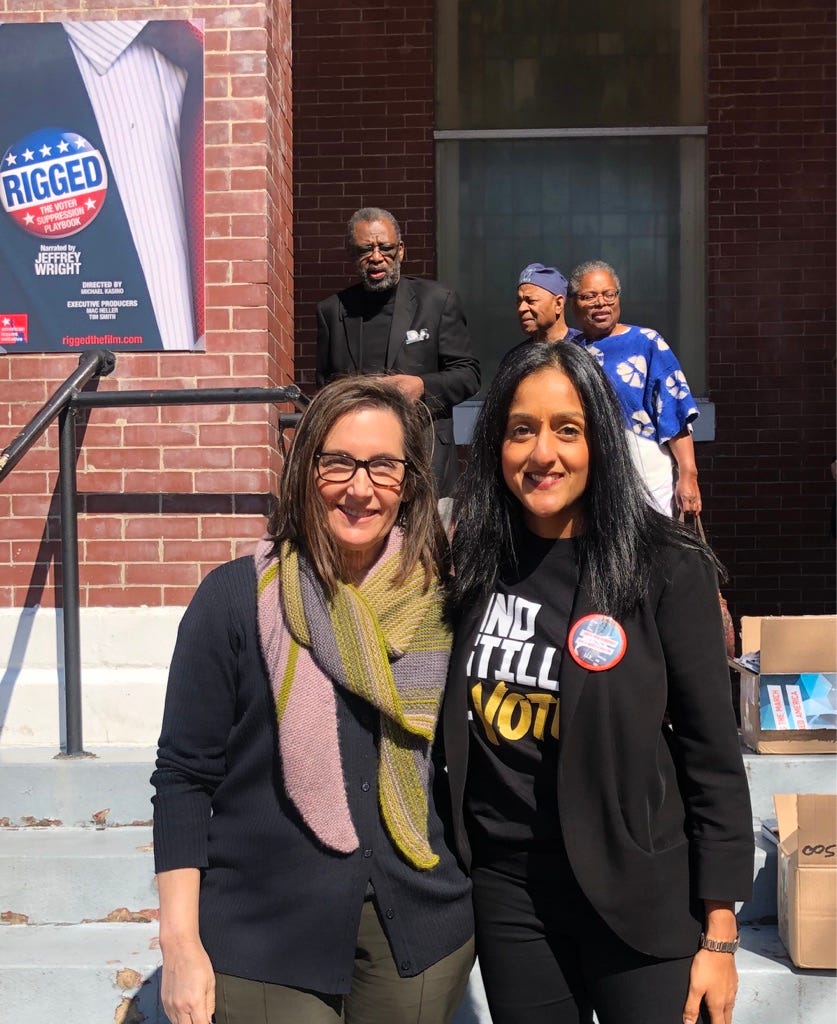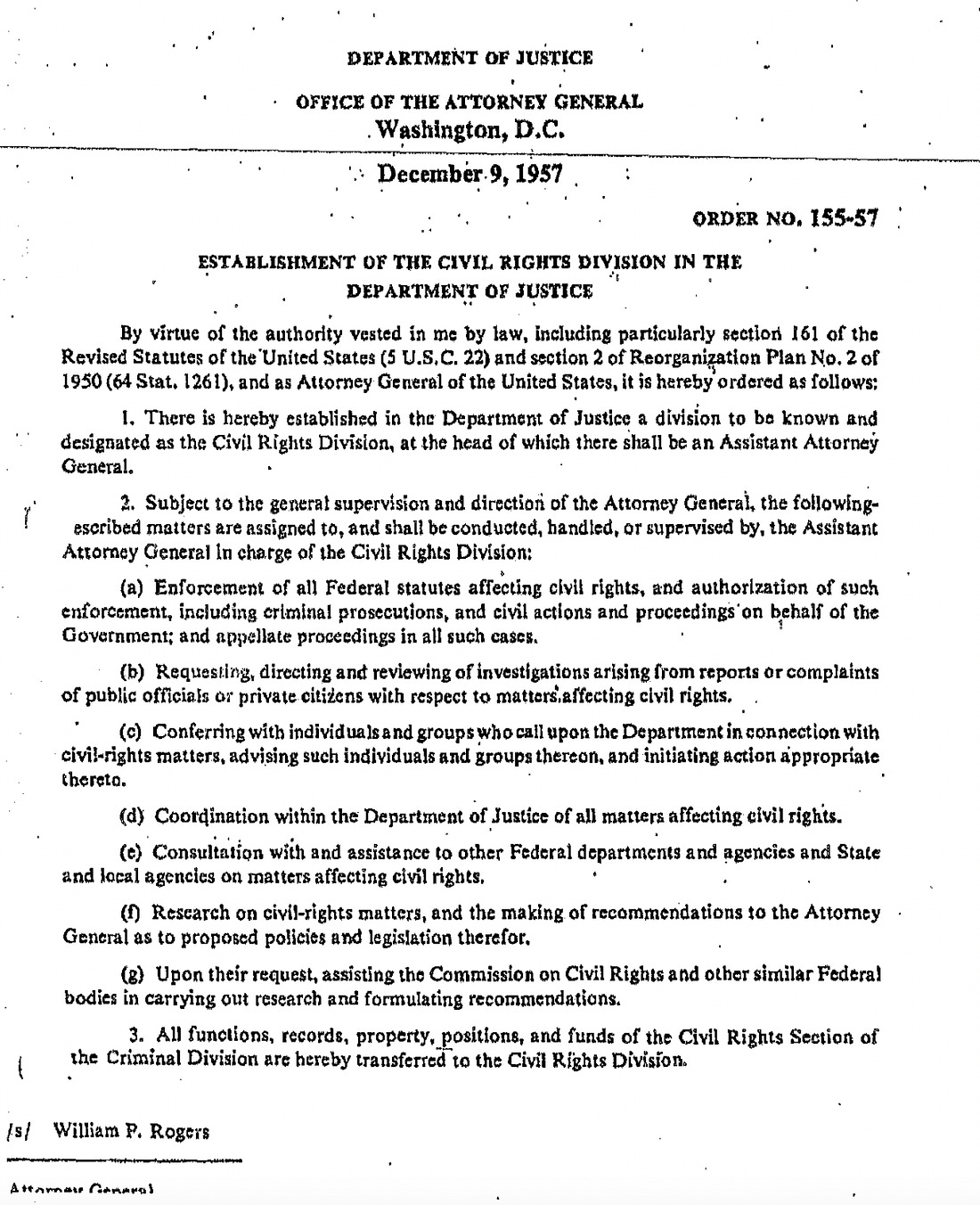|
 |
On Tuesday, Reuters reported that leadership at the Department of Justice has reassigned “about a dozen senior career attorneys” in the Civil Rights Division to perform perfunctory tasks usually assigned to lower level attorneys, like responding to FOIA requests. Three senior career attorneys who managed offices that handled cases involving excessive force and other abuses by police, voting rights, and the rights of people with disabilities were among the casualties of this wave of efforts by the Trump administration to disrupt the work done in the Civil Rights Division, which is frequently referred to as the crown jewel of the Justice Department. The changes have not been publicly announced by Attorney General Pam Bondi or her staff, according to Reuters.
According to other reporting, a series of memos have radically altered the mission of key sections in the Division. For instance, one for the voting section, “barely mentions the Voting Rights Act and instead says the section will focus on preventing voter fraud – which is exceedingly rare – and helping states find noncitizens on their voter rolls (noncitizen voting is also exceedingly rare).” The memo for the Housing and Civil Enforcement section neglects to mention the Fair Housing Act, which has protected people from discrimination since it was passed in 1968 and is a centerpiece of the Division’s work—but apparently, no longer.
Career employees in the Division seem shell-shocked, many of them leaving or preparing to, in hopes they will be able to continue at least some of the work that matters to them so deeply outside of government, since it seems to no longer be possible on the inside.
The Civil Rights Division was created as a result of Congress’ passage of the Civil Rights Act of 1957. The Division enforces federal laws that prohibit discrimination based on race, color, sex, religion, national origin, disability, gender, sexual orientation, and other factors. The Civil Rights Act of 1964 expanded the Division’s jurisdiction to enforce anti-discrimination laws aimed at integrating public facilities, public accommodations, employment, and schools. It also enforces federal civil rights laws that protect people’s rights to be free of discrimination in employment, housing, education, voting, and access to public accommodations. In addition, it prosecutes violations of civil rights crimes like police use of excessive force and hate crimes. Its attorneys travel all across the country, frequently partnering with United States Attorneys’ offices to protect Americans’ civil and constitutional rights.
 |
The Division really is the crown jewel of the Department; the work its people do makes us a better country in very real ways. Losing it is unthinkable. Just off the top of my head, some of the work my office did with them included protecting the rights of diabetic school children, making sure voters in wheelchairs could access their polling places, and prosecuting police use of excessive force that left people badly injured. We worked on a string of church fires, a cross burned at the home of an interracial couple, helping a community process the revelation that several police officers were members of a successor group to the Ku Klux Klan. Now, much of that will be lost.
The Division’s website (catch it while you can) currently explains that “Congress created the Civil Rights Division in 1957 to uphold the civil and constitutional rights of all Americans, particularly some of the most vulnerable members of our society. The Division enforces federal statutes prohibiting discrimination on the basis of race, color, sex, disability, religion, familial status, military status and national origin.”
Trump’s pick to run the Civil Rights Division is Harmeet Dhillon, an attorney with a history of attacking voting rights. She was confirmed on a 52-45 vote, with Alaska’s Lisa Murkowski the only Republican vote against her. According to Marc Elias, she has worked on lawsuits challenging laws that make it easier for more people to vote and defended against efforts to disqualify Trump from appearing on several states’ ballots in 2024. None of that is encouraging for people who believe protecting the right to vote is a critical piece of the Civil Rights Division’s work.
A 2021 piece in the Yale Law Journal recounts the Division’s creation, noting that it was “broadly understood to be in part a response both to the horrors of the Holocaust and to a Cold War reality where Communists routinely criticized the United States’ hypocrisy in how Black Americans were treated.” It’s ironic that Trump continues to take apart the Division during the same week when he is on the attack against Harvard and others, who he claims have made insufficient efforts to address antisemitism. That’s precisely what the Civil Rights Division does.
Among the Division’s work during the Biden administration were cases prosecuting antisemitic hate crimes, including a former Cornell University student who issued threats to kill or injure Jewish students on campus; a California man who firebombed a Planned Parenthood clinic in Southern California and had planned home invasions of Jewish homes in Los Angeles; a California rideshare driver charged with a federal hate crime for an assault on a passenger whom he perceived to be Jewish or Israeli; and an Oregon man charged with hate crimes for defacing a synagogue in Eugene. The Department also prosecutes hate crimes against Muslims, Asians, and others when crimes against them are motivated by racial, religious, and other types of constitutionally prohibited animus.
Under Trump, the Division is taking on a new focus: protecting Christians from discrimination. I have no issue with that work—Christians’ civil rights are due the same protection as everyone else’s. But the Division’s work has always reflected the reality that it is marginalized groups whose rights are most at risk and who need protection. This new bent seems to be more about prioritizing one faith at the cost of others, approaching violation of the First Amendment’s prohibition against the establishment of any one religion. The most recent press releases from the Civil Rights Department are disturbing.
Other recent releases include ones headlined as:
While there are still announcements of cases involving the Division’s traditional work, especially with the news that employees are being removed, while others are leaving, the outlook isn’t good. In a memo in the first weeks of her tenure, Attorney General Bondi

